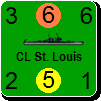Tarhunnas
Posts: 3152
Joined: 1/27/2011
From: Hex X37, Y15
Status: offline

|
quote:
ORIGINAL: alfonso
The OP argued that this game has the flaw from the historical point of view that the players play without historical political imperatives to force them to play “for something”. He subsequently throws history out of the window by proposing Simferopol or Stalingrad as a key points for the German campaigns since the start. I really have serious doubts about Simferopol being an important part of Hitler rationale for invading the USSR. I think that the easy willingness perceived in some posts for exchanging geographical locations for political imperatives (as if they were the same) shows some lack of consistency in the proposal.
Each Axis player should have the option to choose what cities he wants (for depriving the other side of manpower, to grab resources, to “activate” the Finns…). If I think that the conquer of Crimea is a diversion I cannot afford to reach my ultimate objectives, why should I be forced, or even encouraged, to conquer it? Why not Engels and Saratov? If many players are already not willing to follow Hitler’s imperatives, with more reason they are going to be reluctant to follow Tarhunna’s imperatives.
The game already rewards the possession of urban hexes at the end, and the player who holds them more turns has already the correspondent manpower and resource benefits. The VP system is a generous (albeit a little bit non-historical) attempt to give the Axis a fair chance to “win”. If we want to play a historical 1941 GC game, as stated by the OP, anything that is not the complete destruction of the Soviet will to fight is a German defeat. And if we want force us to reach historical geographical objectives, then everything short of the Murmansk-Astrakhan line is a German defeat.
That said, I think that as option, or mod, or scenario, or whatever (optative) the proposal is interesting, but I don’t like the suggestion that those who are more or less OK with the victory points being earned only at the end turn are playing “for nothing” or playing a non-historical game.
Summarizing, the proposal has its merits, but presenting it as more “historical” is unfair.
No, as I said in #59, my suggestion was that all city hexes would give 1 VP to the player posessing them at the end of the turn. Thus, Engels and Saratov, as cities, would give VP to the side that controlled them.
I suggested 2 VPs per turn for some cities, among them Simferopol, not because the place in itself is important, but to simulate the political effect (on turkey and Rumania etc) of occupying the Crimea. This would give the player the option of either bypassing the Crimea to pursue other aims, foregoing the VPs, or taking it to gain the VPs, simulatiing the political imperatives for taking it.
|
 Printable Version
Printable Version








 ), but hopefully only in the last couple of turns. With a turn based victory system, I am afraid that the “gameyness” could extend earlier: in my example above, bypassing the chance of destroying the German Army and grabbing Simferopol instead.. In any case, there is the possibility for an Army without soldiers to win the war. It is bad that this can also happen now in May 1945, but in 1944….
), but hopefully only in the last couple of turns. With a turn based victory system, I am afraid that the “gameyness” could extend earlier: in my example above, bypassing the chance of destroying the German Army and grabbing Simferopol instead.. In any case, there is the possibility for an Army without soldiers to win the war. It is bad that this can also happen now in May 1945, but in 1944…. 

 New Messages
New Messages No New Messages
No New Messages Hot Topic w/ New Messages
Hot Topic w/ New Messages Hot Topic w/o New Messages
Hot Topic w/o New Messages Locked w/ New Messages
Locked w/ New Messages Locked w/o New Messages
Locked w/o New Messages Post New Thread
Post New Thread